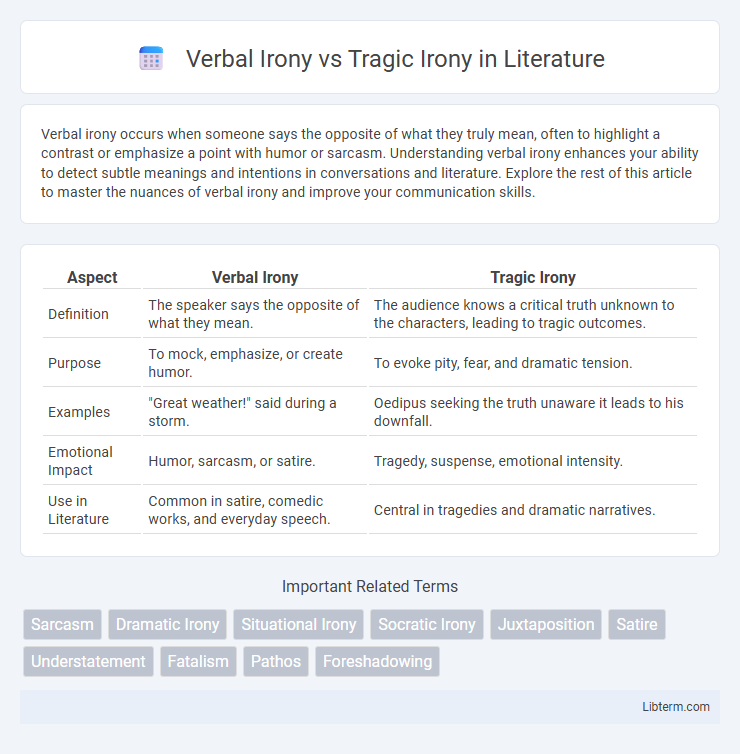Verbal irony occurs when someone says the opposite of what they truly mean, often to highlight a contrast or emphasize a point with humor or sarcasm. Understanding verbal irony enhances your ability to detect subtle meanings and intentions in conversations and literature. Explore the rest of this article to master the nuances of verbal irony and improve your communication skills.
Table of Comparison
| Aspect | Verbal Irony | Tragic Irony |
|---|---|---|
| Definition | The speaker says the opposite of what they mean. | The audience knows a critical truth unknown to the characters, leading to tragic outcomes. |
| Purpose | To mock, emphasize, or create humor. | To evoke pity, fear, and dramatic tension. |
| Examples | "Great weather!" said during a storm. | Oedipus seeking the truth unaware it leads to his downfall. |
| Emotional Impact | Humor, sarcasm, or satire. | Tragedy, suspense, emotional intensity. |
| Use in Literature | Common in satire, comedic works, and everyday speech. | Central in tragedies and dramatic narratives. |
Introduction to Verbal Irony and Tragic Irony
Verbal irony occurs when a speaker says something but means the opposite, often to create humor or emphasize a point, exemplified by sarcastic remarks or witty dialogue. Tragic irony, a form of dramatic irony, involves a situation where characters are unaware of crucial information that the audience knows, leading to inevitable disastrous consequences. Both types of irony enhance narrative depth by contrasting appearance with reality, but verbal irony centers on language while tragic irony hinges on plot and fate.
Defining Verbal Irony
Verbal irony occurs when a speaker says something but means the opposite, often to convey sarcasm or humor. This form of irony contrasts with tragic irony, where the audience is aware of impending doom or fate unknown to the characters. Understanding verbal irony is essential for interpreting tone and subtext in literature and everyday communication.
Explaining Tragic Irony
Tragic irony occurs when the audience possesses critical knowledge that the characters lack, leading to outcomes that are both inevitable and devastating, heightening emotional engagement. Unlike verbal irony, which involves a speaker saying the opposite of what they mean, tragic irony unfolds through dramatic situations where a character's actions, motivated by incomplete understanding, result in unintended consequences. Classic examples include Sophocles' "Oedipus Rex," where the protagonist's ignorance about his own origins leads to his downfall, exemplifying tragic irony's power to evoke pity and fear.
Key Differences Between Verbal and Tragic Irony
Verbal irony occurs when a speaker says something but means the opposite, creating a contrast between literal and intended meaning, often found in everyday conversations and literary dialogue. Tragic irony, a subtype of dramatic irony, arises in literature when the audience knows critical information unknown to the characters, leading to tragic outcomes, typical in classic tragedies like Sophocles' "Oedipus Rex." The key difference lies in verbal irony's use of contradictory expression for humor or emphasis, while tragic irony hinges on dramatic tension from the audience's foreknowledge of inevitable misfortune.
Common Examples of Verbal Irony
Common examples of verbal irony often include sarcastic remarks where the intended meaning contrasts sharply with the literal words spoken, such as saying "What a beautiful day" during a storm or "Great job" after a mistake. This form of irony is prevalent in everyday conversations, literature, and comedy, where speakers convey humor, criticism, or subtle emphasis through exaggerated or opposite expressions. Verbal irony differs from tragic irony, which centers on dramatic situations where characters are unaware of crucial facts leading to their downfall, rather than spoken contradictions.
Notable Instances of Tragic Irony in Literature
Tragic irony prominently features in Shakespeare's "Oedipus Rex," where Oedipus unknowingly condemns himself by seeking the murderer of Laius, his true father, highlighting the devastating gap between perception and reality. In Sophocles' "Antigone," Creon's rigid decree inadvertently leads to the deaths of his family members, illustrating the destructive consequences of his ignorance. These instances underscore tragic irony's power to evoke profound emotional impact through characters' unavoidable fates shaped by their limited understanding.
Purpose and Effects of Verbal Irony
Verbal irony serves to create humor and emphasize contrasts between appearance and reality by stating the opposite of what is meant, often highlighting sarcasm or mockery. Its purpose is to engage the audience through wit and to critique or expose underlying truths in a subtle manner. The effect of verbal irony deepens character development and sharpens dialogue, making the communication more impactful and memorable.
Impact and Significance of Tragic Irony
Tragic irony intensifies emotional engagement by highlighting the gap between a character's understanding and the actual situation, often leading audiences to experience profound pity and fear. This form of irony deepens the narrative's impact by emphasizing fate's inevitability and human vulnerability in classical tragedies. Unlike verbal irony, which typically creates humor or sarcasm, tragic irony evokes a sense of unavoidable doom and moral reflection.
How Writers Use Verbal vs Tragic Irony
Writers use verbal irony to create humor or emphasize contradictions by having characters say the opposite of what they mean, often enhancing dialogue and reader engagement. In contrast, tragic irony is employed to build tension and evoke emotional responses by allowing the audience to know critical information that characters are unaware of, deepening the impact of unfolding events. Both forms of irony strategically manipulate audience perception to enrich storytelling and highlight themes.
Conclusion: Choosing the Right Irony for Your Narrative
Selecting verbal irony enhances character voice and humor by emphasizing contrast between spoken words and intended meaning, while tragic irony deepens emotional impact through audience awareness of impending disaster unknown to characters. Writers aiming for subtle wit and satire benefit from verbal irony's flexible tone, whereas tragic irony intensifies dramatic tension and thematic depth in serious narratives. Understanding these distinctions ensures effective narrative engagement and resonance with the audience.
Verbal Irony Infographic

 libterm.com
libterm.com